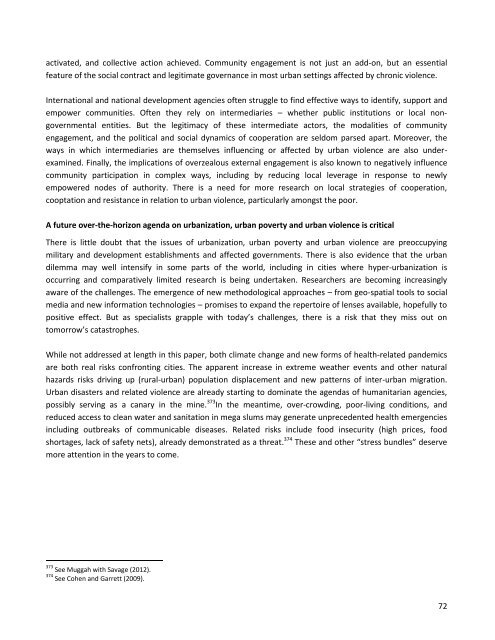Researching-the-Urban-Dilemma-Baseline-study
Researching-the-Urban-Dilemma-Baseline-study
Researching-the-Urban-Dilemma-Baseline-study
You also want an ePaper? Increase the reach of your titles
YUMPU automatically turns print PDFs into web optimized ePapers that Google loves.
activated, and collective action achieved. Community engagement is not just an add-on, but an essential<br />
feature of <strong>the</strong> social contract and legitimate governance in most urban settings affected by chronic violence.<br />
International and national development agencies often struggle to find effective ways to identify, support and<br />
empower communities. Often <strong>the</strong>y rely on intermediaries – whe<strong>the</strong>r public institutions or local nongovernmental<br />
entities. But <strong>the</strong> legitimacy of <strong>the</strong>se intermediate actors, <strong>the</strong> modalities of community<br />
engagement, and <strong>the</strong> political and social dynamics of cooperation are seldom parsed apart. Moreover, <strong>the</strong><br />
ways in which intermediaries are <strong>the</strong>mselves influencing or affected by urban violence are also underexamined.<br />
Finally, <strong>the</strong> implications of overzealous external engagement is also known to negatively influence<br />
community participation in complex ways, including by reducing local leverage in response to newly<br />
empowered nodes of authority. There is a need for more research on local strategies of cooperation,<br />
cooptation and resistance in relation to urban violence, particularly amongst <strong>the</strong> poor.<br />
A future over-<strong>the</strong>-horizon agenda on urbanization, urban poverty and urban violence is critical<br />
There is little doubt that <strong>the</strong> issues of urbanization, urban poverty and urban violence are preoccupying<br />
military and development establishments and affected governments. There is also evidence that <strong>the</strong> urban<br />
dilemma may well intensify in some parts of <strong>the</strong> world, including in cities where hyper-urbanization is<br />
occurring and comparatively limited research is being undertaken. Researchers are becoming increasingly<br />
aware of <strong>the</strong> challenges. The emergence of new methodological approaches – from geo-spatial tools to social<br />
media and new information technologies – promises to expand <strong>the</strong> repertoire of lenses available, hopefully to<br />
positive effect. But as specialists grapple with today’s challenges, <strong>the</strong>re is a risk that <strong>the</strong>y miss out on<br />
tomorrow’s catastrophes.<br />
While not addressed at length in this paper, both climate change and new forms of health-related pandemics<br />
are both real risks confronting cities. The apparent increase in extreme wea<strong>the</strong>r events and o<strong>the</strong>r natural<br />
hazards risks driving up (rural-urban) population displacement and new patterns of inter-urban migration.<br />
<strong>Urban</strong> disasters and related violence are already starting to dominate <strong>the</strong> agendas of humanitarian agencies,<br />
possibly serving as a canary in <strong>the</strong> mine. 373 In <strong>the</strong> meantime, over-crowding, poor-living conditions, and<br />
reduced access to clean water and sanitation in mega slums may generate unprecedented health emergencies<br />
including outbreaks of communicable diseases. Related risks include food insecurity (high prices, food<br />
shortages, lack of safety nets), already demonstrated as a threat. 374 These and o<strong>the</strong>r “stress bundles” deserve<br />
more attention in <strong>the</strong> years to come.<br />
373 See Muggah with Savage (2012).<br />
374 See Cohen and Garrett (2009).<br />
72




